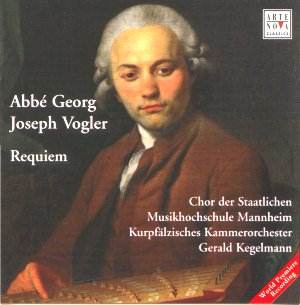Abbé Georg Joseph VOGLER (1749 -
1814)
Requiem in E Flat Major (arr. Dr. Joachim Veit)
[57.00]
 Chor der Staatlichen Musikhochschule Mannheim
Chor der Staatlichen Musikhochschule Mannheim
Kurpfalzisches Kammerorchester.
Sabine Goetz (soprano), Barbara R. Grabowski (alto),
Christopher Wittmann (tenor), Rudolf Piernay (bass).
Gerald Kegelmann (conductor).
DDD Recorded July 16/17 1999. SWR Studio
Kaiserslautern
 ARTE NOVA Classics 74321 71663 2
[57.00]
ARTE NOVA Classics 74321 71663 2
[57.00]
Crotchet Bargain price

The name Vogler means little to record buyers today, yet in his time he was
one of those musicians who was important and to some extent influential.
He was a man who shared his life between the Church - ordained as a young
man hence the title Abbé - and music. A much travelled man whose
perigrinations took him all over Europe and into North Africa even - he was
employed by Royalty, sometimes in a dual capacity as priest and Court musician,
throughout the continent. His association with Mannheim where he founded
the Music School is best remembered. Among his students there were three
whose names will be familiar - Weber, Meyerbeer and Danzi.
In addition to his teaching, Vogler's composing produced 10 operas, much
church music and organ preludes in every key (with a full analysis). Much
of the rest of his time was occupied by his efforts to simplify and improve
the construction of organs - an interest that took him on his travels with
various portable organs of his own design. None of his projects made him
much money and he died - a poor man - in 1814.
Vogler's Requiem was highly regarded by some of his contemporaries.
His pupils could not praise it highly enough - Weber referred to a "divine
Requiem" and it was compared by critics of the time to the Mozart
Requiem. Vogler himself made a comparison that painted his own composition
in a favourable light. Posterity had its say and the work disappeared. This
CD is an attempt by an enterprising smaller label to put the composition
back into the repertory and it deserves to succeed.
The work dates from 1809 but contains much of its origins from 1776. It has
old elements to its - shades of Handel in the underlying bass line to the
Lutheran Chorale in Te decet I - yet generally it points forward rather
than looks back. Old or new, the blend is a happy one. It follows the normal
layout of the Mass with six parts and all 27 sections are banded though the
Latin text is omitted.
Choral singing is the focal point of the work and the Mannheim Choir is well
up to the challenge. Spirited and with that freshness that comes from young
voices the recording favours the voice in a pleasant acoustic that has just
a touch of resonance. There are some lovely moments for the Choir - Domine
Jesu Christe of the Offertorium is especially attractive. The
fine soloists have their chance to shine in the unaccompanied, rather theatrical
Benedictus.
Vogler was known for his "effects" - the special embellishments he built
around ostinato phrases on woodwind and brass and the prominence he gives
them at times . There is some appeal to us today in their novelty value,
but one wonders how a regular diet of these effects would soon degenerate
into gimmickry. The Chamber Ensemble is excellent and conductor Gerald Kegelmann
handles his diverse forces well.
More than merely interesting, this CD brings back to life an unknown work
that has considerable merit and which may in time establish sufficient support
to have the occasional concert airing. Considerable effort and scholarship
have gone into this recording and the results are commendable.
Reviewer
Harry Downey

